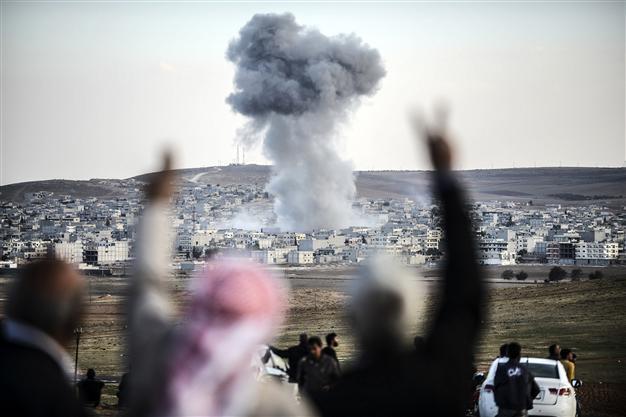Kobane aid triggers Turkey-US debate
WASHINGTON/RIGA

A picture taken from the southeastern Turkish village of Mürşitpınar shows people looking on as smoke rises following an attack by jets in Kobane on Oct. 22. AFP Photo
Washington took the initiative to airdrop ammunition and weapons to Kurdish fighters battling jihadists in Kobane despite Turkey’s objections, President Recep Tayyip Erdoğan has said, in a bid to underline that Ankara does not consider the Democratic Union Party (PYD) a legitimate counterpart, regardless of U.S. views.
“Did Turkey view this business positively? No it didn’t. America did this in spite of Turkey, and I told [Obama] that Kobane is not currently a strategic place for you; if anything, it is strategic for us,” Erdoğan said during a news conference in Riga on Oct. 23, referring to his latest telephone conversation with U.S. President Barack Obama that took place at the latter's initiative on Oct. 19.
The Turkish government views the PYD with deep suspicion because of its ties to the outlawed Kurdistan Workers’ Party (PKK) and has previously turned down requests for it to open a land corridor so that Kobane could be resupplied from other Kurdish areas of northern Syria.
“I told him that the PYD is in the same situation as the PKK. I said ‘[The PYD] is also a terrorist organization,’” Erdoğan said.
He added that he stressed to Obama that the U.S. aid to the PYD was going to a terrorist organization and that there were PKK leaders among the PYD militants fighting against the Islamist State of Iraq and the Levant (ISIL).
Erdoğan also repeated his argument that reports that some airdropped supplies ended up in the hands of jihadist militants proved that his objections were right.
In response to earlier statements by Erdoğan, the U.S. capital has already said the PYD’s legal situation in the United States was different than that of the PKK, which is on its list of Foreign Terrorist Organizations.
Speaking on Oct. 22, State Department spokeswoman Marie Harf said Washington did not think the U.S. airdrop operation was wrong.
When asked during the State Department’s daily foreign press briefing later on the same day if the U.S. thought the operation was a mistake, Harf simply answered: “Not at all.”
“[Obama] has made very clear why we consider it urgent and essential to resupply the fighters in Kobane who are in a desperate situation,” she added, referring to Erdoğan and Obama’s recent telephone conversation.
In her remarks, Harf sought to avoid indicating a conflict between the allies, but underlined that the U.S. stood behind the logic of the airdrop operation.
“We’ll let the Turkish government speak for itself, but allowing ISIL to seize more territory along the border with Turkey could endanger more Syrian communities and threaten our shared interest with Turkey in defeating ISIL and strengthening the moderate opposition,” she said.
Harf also responded to reports that some airdropped weapons had fallen into the hands of ISIL, without confirming that at least one cache of supplies had fallen to ISIL.
“All military missions incur some risks. But the alternative of doing nothing, of not making sure the fighters pushing ISIL back on the ground in and around Kobane have the weapons and the ammunition they need and the medical supplies they need – we don’t think [that] is a viable option,” she said.
Erdoğan: 200 Peshmerga will cross into KobaneMeanwhile, Erdoğan also reiterated Ankara’s insistence on mainly supporting the Free Syrian Army (FSA), seeing it as “the only group which should be supported in Syria against ISIL.” He did, however, confirm the agreement to send Iraqi Kurdish Peshmerga forces to Kobane.
“There are two important groups here, which can function and be significant for Kobane. The Free Syrian Army is our first choice and the second is the Peshmerga. And we told the Peshmerga that we will allow them to pass through our country under control,” he said.
Turkey’s announcement that it would permit the Peshmerga to cross Turkish soil to reach Kobane was interpreted as a sign of a U-turn in Turkey’s stance over the issue.
In the first step after Turkey’s announcement, the Kurdistan Regional Government (KRG) in northern Iraq said it decided to send 200 Peshmerga fighters with heavy weapons to Kobane.
“I have learned that they finally reached agreement on a figure of 200 [fighters],” Erdoğan said.
